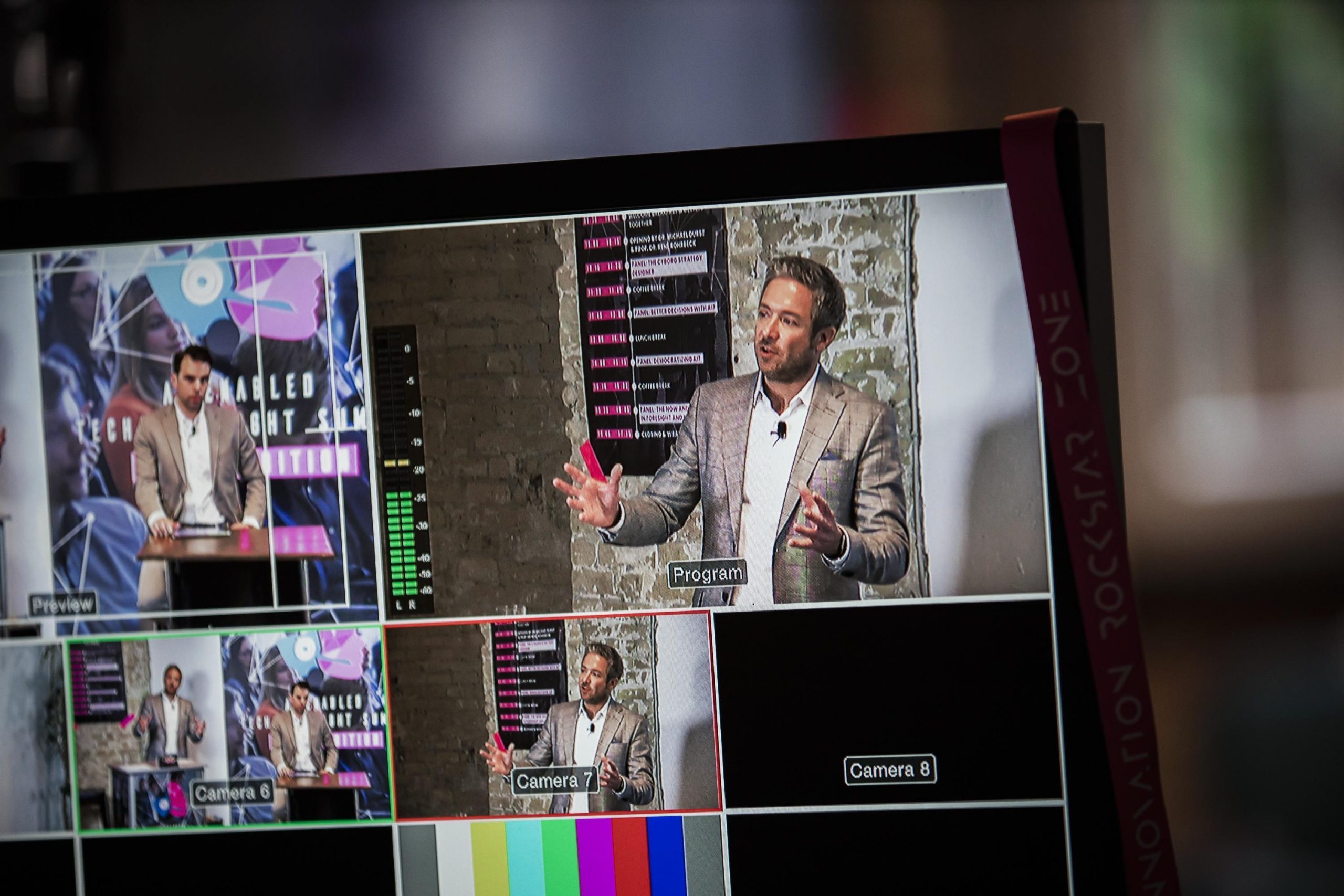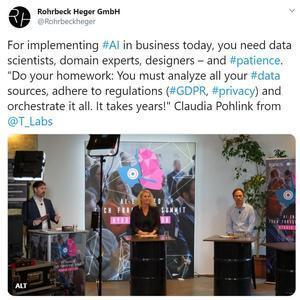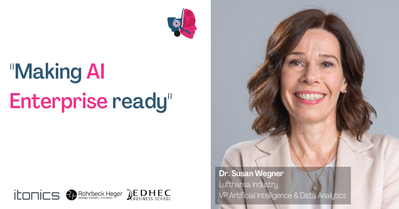
An AI-enabled Tech Foresight Summit like no other
If there is one thing we might take away from 2020, it is that it certainly helps to prepare for the unexpected.
As we have all learnt this year, living through a pandemic exposes weaknesses in companies that cannot swiftly adapt to changing circumstances, especially those that were already hesitant about moving with these increasingly digitalising and data-driven times.
Conversely, it is the case that companies that do have a future-facing mindset have found ways to cope with, and in some cases, even thrive amid this unique brand of uncertainty and crisis. They have done so using creativity, agility and a host of first-rate decision-making skills undergirded by sound and rigorous understanding of the potential data offers us in this area.
At Rohrbeck Heger, we ourselves have been put to the test and forced to modify many approaches that worked well for us before the crisis struck. A core pillar of our work involves bringing people together and fermenting discourse in a variety of offline scenarios, which, naturally, had to go online.
A cherished event on our calendar, our AI-enabled Tech Foresight Summit, in which, in partnership with ITONICS and the EDHEC business school, we bring together a host of world-renown speakers operating at the cutting edge of business, politics and advocacy, also underwent a drastic change in format: We offered our audiences a hybrid platform boasting panels that combined in studio chats and live missives from a host of home offices beyond Berlin.
We were excited to engage with audiences by experimenting with ways to make the most out of the diverse forms of interaction that took place that day, accumulating insight into how our audiences related to the ideas and themes explored in panels via polls and questionnaires. One poll in particular struck me as insightful: It revealed that very few companies seem ready to work with data, and that that was because few – only 52 per cent of those polled – had data at all.
Who’s afraid of big data?
That discovery came as a surprise, and proved just how important it is for our community to engage with and learn from pioneering AI experts such as those gracing our panels. Through the day, we learnt about how forward-thinking companies are starting to harness the potential of data and artificial intelligence in determining their course of action, what such work truly entails, and how far we’ve come and have left to go.

That was a subject that lay at the heart of our first panel, in which Claudia Pohlink, who heads up Artificial Intelligence at Deutsche Telekom’s research unit, described the painstaking and nitty-gritty effort that goes into using big data and AI – a point echoed by Innovation Head of Siemens’ Bernd Blumoser, as Didier Boulet, the Group Chief Designer at Thales, emphasized how integral a human-centered design that inspires – and warrants – trust, is to artificial intelligence.
“We need to have realistic expectations around AI, as it’s not a magic tool. It’s hard work,” said Blumoser, a comment elaborated on by Pohlink, who went into describing the cross-disciplinary complexity that comes with dealing with big data and using it to make smart decisions.
“You have to organize all these data sources, and you have to orchestrate. And you don’t just need data scientists, you also need domain experts,” she said. “You cannot just take a data set and put that into the machine learning software and expect some results. You need specific questions where you think artificial intelligence or data and analytics can answer these questions. And finally, you need patience.”
In this ‘Cyborg Strategy-Designer’ panel, which explored thoughts on what the relationship between man and artificial intelligence will look like in the years to come – and the extent to which we will be able to pass on important decision-making responsibilities to our machines, we addressed the question of whether passing on such power might end up endangering or even annihilating us.
“AI poses the most serious threat to the survival of the human race,” Elon Musk has said; an inflammatory statement that our panelists weren’t all that enthusiastic about. Blumoser’s retort was quick and pithy:
“I think the biggest threat for the survival of humanity is the human,” he said, addressing alongside Pohlink and Didier how dystopian Sci-fi has coloured our perception of where artificial intelligence is headed. Another interesting point sprung from Pohlink raising the question of whether gender plays a part in how we perceive threat, competition and the inevitability of aggression, noting that, from her experience at least, doomsday AI commentators tend all to be men.
She went on to remind audiences that our fears of AI stem from particular biases, and that, in any case, the AI the world operates with at present is simply “pure statistics,” in which predictions for the future are made based on historical data. Provided we do enough “homework” and take care not to let these biases get in the way, such insights can help us make wiser decisions, she said.
My main takeaway from this enlightening panel is that while there is certainly a great deal of promise in this area of using AI for strategic decision-making, we still have a long way to go – and that we’re unlikely to see a Terminator show up and wreak havoc on the world any time soon.
The future of decision-making
Our second panel flowed seamlessly from the first, featuring a group of online and offline speakers delving deeper into the subject of decision-making, particularly in the short term. This at times scintillatingly recondite session my co-founder René Rohrbeck kicked off by explaining, from his home office in Lille, the evolutionary-basis behind the mistrust humans have in algorithms, and how this is something we might have to unlearn if we are to make the most out of big data’s potential to guide us.
He was joined in the panel ‘Better decisions with AI’ by virtual participants Michael Berns, a veteran consultant who currently serves as director at PwC’s AI and FinTech practice, and Michael Grottke, the principal scientist at GfK SE and professor at Friedrich-Alexander-Universität Erlangen-Nürnberg who likes to debunk AI’s hype and push for better understanding of the reasoning systems this term represents.
Lufthansa’s Artificial Intelligence and Data Analytics VP Dr. Susan Wegner joined us in flesh, and hammered home Pohlink’s earlier point, that using AI to support decision-making is no child’s play and that collaboration across departments is key to getting this done.

To help us really understand the realities of working in this way, she described how Lufthansa cargo were able to make various predictions, including forecasts of which routes would be most profitable based on customer demand using a variety of strands of data and techniques. Like Pohlink, she emphasized the importance of collaboration between data scientists and domain experts.
Among the challenges we heard about, Wegner described how resistance from different departments unwilling to accept new technologies posed a continued struggle, especially when it came to having them work from the cloud.
These were just some of the fascinating insights gleaned from a session that revealed how we’ve come a lot closer to using AI to at least support decision-making.
Visions and values for the road ahead
A much broader conversation followed right after lunch, during which we dove into a host of meaty topics around AI’s relationships with societies of the future, kicking off discussion with an enlightening spitballing session of how each participant envisioned an AI-enhanced world 20 or 30 years on from now.
These futuristic visions, which encompassed personal dystopias and utopias, drew from the expertise of three influential speakers who helped us contemplate and consider what values it is we most want to hold on to through these disruptions.
AI healthcare activist Bart de Witte, who has founded Hippo AI Foundation – the world’s first global NGO for open source based AI in medicine, shared his two cents of what 2030 might look like, alongside Managing Director of the German AI association, Vanessa Cann, who brought her perspective as a political scientist, and Dr. Tanja Jovanovic, a business innovation expert.
“AI is a tool, it’s an instrument. And it really depends on how we use it, so it can be in the interests of society,” said Cann. “But, on the other hand, it can also be in the interests of single people, of single companies,” she said, warning that issues around the sharing of data will persist in Europe if we find ourselves dependent on Chinese and American companies.
“I think we have to be careful about really developing our own AI that also enforces our European values,” she added. This expansive conversation covered all things political, economical, social and technological related to AI, trust, open data and the question of how data will be handled.
Countless takeaways to be had here, and it was a delight to hear about the ways in which we might – as individuals and as a society – have agency in shaping our cultures and societies as they develop with increasing enmeshment with machines. And that trust is paramount.
Forecasts on foresight
Rounding off a long and stimulating day was a discussion on a topic very close to my heart of course, and that is innovations in foresighting.
We welcomed a lively panel of experts in this area, including Sven Taubert who heads up Corporate Foresight & Market Intelligence at Lufthansa Technik and who brought a refreshing whimsy to the conversation, alongside Prof. Dr. Sven Schimpf, Managing Director at Fraunhofer Group for Innovation Research and Dr. Michael Durst, Founder & CEO of ITONICS GmbH.
Here audiences could build on much of what was learnt through the day about where AI might take us and empower us in terms of being clever, agile and efficient in our business strategies, while exploring how AI can and will add value to organizations.
Much food for thought here, but some of my favourite observations were on the limits of such technologies, the limits on AI – inviting us to contemplate what it is that makes us human.
“AI will never replace the imagination,” said Schimpf rather resolutely, while expounding on a host of fascinating work driving AI-fueled innovation at Fraunhofer.
While AI cannot replace the imagination, it does have potential to play a facilitatory role, he explained, offering curious cases. Meanwhile, on the subject of AI’s limits, Taubert described a scenario in the iconic Science Fiction series, Douglas Adams’ ‘The Hitchhikers’ Guide to the Galaxy’, in which a vast computer is asked for “the answer to the meaning of life, the universe, and everything,” and responds with ‘42’ – a real head scratcher for everyone involved. Taubert then reminded us that it is unlikely that we’ll be enjoying a beer or two with our AI. Although, who knows. It’s good to be prepared for all sorts of future outcomes, as we like to remind our clients and communities time and again.
Levity aside, this session served as a sobering reminder that while certain trends and supports in this area are promising, we still have a long way to go when it comes to harnessing AI’s foresight potential to support innovation. This said, I am thrilled to see how this space unfolds as such technologies grow up alongside societies as a whole.
These are just some of the fascinating insights we were all privileged to enjoy through a day so thought-provoking I am already looking forward to next year’s edition. I would like to take this opportunity to thank everyone involved for their support and myriad talents.
To receive access to the full recordings of the summit, click here.
